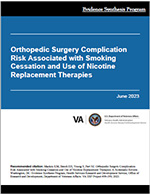
|
Recommended citation: |
Download PDF: Complete Report, Executive Summary, Report, Appendices
Little evidence is available on the impact of smoking cessation interventions on complication risk following elective orthopedic surgery. Important questions remain about the degree to which short-term tobacco cessation interventions among active tobacco users mitigate the risk of complications after elective orthopedic surgery – and the extent to which improved patient functionality and quality of life that results from surgery outweigh these risks.
To best determine if tobacco cessation prior to elective orthopedic surgery should be recommended or required, improved understanding of the degree of risk reduction associated with tobacco cessation interventions in the preoperative period is needed. The aim of this review was to synthesize evidence on the effectiveness of preoperative smoking cessation interventions and use of nicotine replacement therapy at reducing complication risk associated with elective orthopedic surgery.
Among 265 potentially relevant articles, we included 4 studies. Little evidence is available on the impact of smoking cessation interventions on complication risk following elective orthopedic surgery. One randomized controlled trial reported a lower risk of wound-related complications among patients offered counseling and nicotine replacement therapy before undergoing total knee arthroplasty or total hip arthroplasty, compared with usual care. Findings from 3 observational studies are at substantial risk of bias. Important questions remain about the degree to which short-term tobacco cessation interventions among active tobacco users mitigate the risk of complications after elective orthopedic surgery and whether reduction in risk varies according to the duration and severity of tobacco use, timing of cessation relative to surgery, and/or use of nicotine replacement therapy.